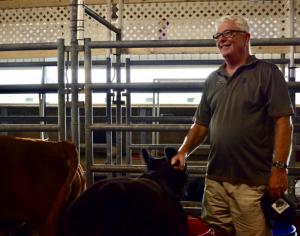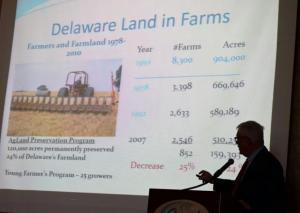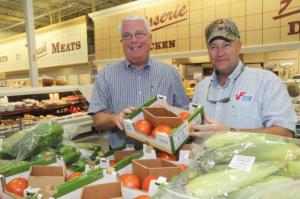Future of farming depends on families, technology
Ed Kee first fell in love with farming in 1968.
He was 16 and had just started spending his summers working for Halsey Knapp, pulling weeds, hoeing and doing other odd jobs around Nassau Orchards.
“I was not skilled labor,” Kee said. “I also got to know the business side – how crops were marketed locally and shipped. That's when I recognized how challenging it is, but how important.”
Fast-forward 48 years and Kee, who recently left the helm of the Delaware Department of Agriculture, still looks back on those summers fondly.
“There was just a tremendous sense of accomplishment every day,” he said, recalling the satisfaction of knowing exactly what went into a hard day's work – about 800 bushels of apples freshly picked, carefully packaged and shipped off to nearby urban markets. A few years later, his education and subsequent 30-year career at the University of Delaware's Carvel Center only deepened that appreciation, he said.
A lot has changed in Delaware's agriculture industry since Kee's summer days at Nassau, but some things have remained constant.
“Nearly every farm is a family operation in Delaware,” he said. Agriculture remains a strong economic driver in the First State and still relies heavily on family farms.
The $8 billion industry supports about 30,000 direct jobs, but farming is much more than a money-maker for the business-savvy person with a knack for early mornings, late nights and dirty hands.
“This is all about producing food,” Kee said. “Yes, it's about farmers' livelihoods, but I've always seen Delaware, Sussex County, Delmarva as a food-shed for the eastern United States and the whole country. Finding solutions to these challenges, whether it's climate change, nutrient management or economics, is really critical not only for the livelihood of farmers, but for the quality of life for all citizens up and down the East Coast.”
Over the years, Kee said technology - improvements in irrigation, tilling practices and plant genetics - has bolstered crop yields from New Castle to Seaford and everywhere in between.
“I can remember when seeing a center-pivot [irrigation system] was a unique thing,” he said. Larger equipment and advanced technology also have made it easier for farmers to cover more ground in less time.
But the ground they're covering is slowly dwindling. Kee estimates that Delaware is losing 1 percent to 2 percent of farmland annually, primarily because of development.
“With farming in an ever-increasing urban or suburban type of atmosphere, land is being developed for housing and other uses. That is what it is,” he said. “But it can drive the cost of land up beyond the farmer's reach. For the land that remains, the most important thing is to make sure all policy makers and citizens understand and respect agriculture, and do what they can to give farmers a chance to be profitable.”
That means it's becoming increasingly important for legislators to recognize the importance of the state's Farmland Preservation Program, which has protected 120,000 acres statewide. More than 40,000 of the preserved acres are in Sussex County.
That also includes the state's Young Farmers Program developed by Kee, which he noted as one of his biggest accomplishments as the department head.
“Frankly, the concept came out of my head, but I'm quick to say I had a lot of help to make that a reality and make it a sound program,” he said. The program, which is tied into farmland preservation, benefits farmers between the ages of 18-40 who are just getting started in the farming business.
“The funding of the ag land preservation program needs to be continued at some level, and hopefully that will be the case,” he said. “Good public policy is what government should do.”
Kee said he's impressed with how local farmers have responded to stricter regulations regarding nutrient management. Nitrogen and phosphorous loads into local waterways have been reduced by more than 40 percent over the last 15 years, he said – but the future of farming truly depends on farmers being able to turn a profit without the cost of business being driven up by government.
“The farmers are prepared,” he said. “They're good business people, they're good stewards of their crops and their livestock and their poultry, they're good mechanics. I think if they're given a chance, and the regulatory burden isn't too much, they'll be just fine.”
Keeping a farm economically sound is likely the biggest challenge facing Delaware's farmers, Kee said.
“Farmers today have to be true businessmen. They have to manage their money and be good marketers,” he said. “That may be a challenge for all independent businessmen, but especially for farmers.”
Going forward, Kee plans to take his decades of agricultural expertise to the Nuffield Farming Scholarships Trust, an international organization that provides scholarships for people interested in researching various aspects of the farming industry. He said he hopes to create opportunities for young farmers to get exposure overseas.
Kee said he also plans to finish out terms on several committees, tackle personal projects at his own farm in Lincoln and spend more time with his family and five grandchildren at Phillies games.
“I've been involved in [agriculture] one way or another since 1968, professionally since 1973, and I just have tremendous appreciation for all the farmers and the agricultural industry in this state,” he said. “But I can assure you I have learned probably more than I delivered with every conversation and every visit in the ag community. I truly appreciate their acceptance of me over the years.”
An inside look at a farmer's life
Driving along the western cusp of the Cape Region, it's clear that development is creeping outward, beyond coveted beach destinations. At the Joseph family farm, nestled between Lewes, Harbeson and Milton, new developments are popping up and so is the traffic on Route 9.
Add a tractor or other piece of farming equipment onto the already congested roadway, and it's not surprising that heads start to spin. But the old tractors – almost matchbox-style compared to the massive combines used today – were running the roads long before newcomers began to realize the benefits of a slower-lower lifestyle.
It was 1915 when Harry Joseph's grandfather, Harry C. Joseph, bought the 162-acre farm near Milton and began Joseph Dairy, which he passed on to his sons, Gilbert and Clayton Joseph. As a young boy, Harry would sometimes help out on Sundays so the regular drivers could have a day off. He'd hop into the truck alongside his father to hand-deliver local milk in glass bottles to residences and businesses from Milton and Lewes to Georgetown.
Gilbert Joseph, even after he sold the milk business in 1969, continued to work the farm fields until the day he died. He wouldn't have had it any other way, his son said.
“I always say farmers don't retire, they just die off,” Harry said matter-of-factly, with a reserved admiration for everything his father taught him about the life of a farmer and what it means to be a good family man.
Shortly before Christmas, Harry and Cheryl Joseph sat down in their kitchen to reflect on the evolution of a family farm that has been in operation for more than 100 years. They are one of 133 Century Farms in Delaware, 80 of which are found in Sussex County.
Old, empty milk bottles sitting on display in their modest home remind Harry of his family's early roots in Sussex County. It's been decades since milk was pasteurized at the farm, and even longer since cows graced the fields, but the Joseph family continues to produce thousands of pounds of vegetables and grains for local poultry companies and JG Townsend Frozen Foods in Georgetown – where there's always a few boxes of baby limas or sweet peas set aside for the Josephs to enjoy.
The couple smiled as they talked about the long hours of hard work they've put into their farm, the hundreds of acres they tend throughout county, and the sweet, familiar smell of succotash on summer evenings.
“It's just my way of life,” Harry said. “Farming is something you've got to love to do because if you don't, you're not going to do it. Period. You have good years, bad years. In farming, every year is different – that's one thing you can bet on.”
He and his wife of 41 years raised their four boys on the family farm, and three of their sons now work alongside Harry tending to more than 800 acres – including the parcel once slated as the future site of the Overbrook Town Center on Route 1 near Milton.
Harry knows times are changing and development in eastern Sussex County is not going to slow down. As Kee said, it is what it is.
“I don't need to step on anybody's toes,” he said. “I'm just a little guy here on the corner.”
Even though the houses and heavy traffic have built up around the Century Farm on Joseph Road, some things will never change. Just as Harry grew up learning exactly where his food came from, he and his wife can now watch their grandchildren learn the same lesson.
“Well,” he said, with that warm Sussex County twang only heard among generational residents, “it means everything to you. You've got a place you can call home.”


































































